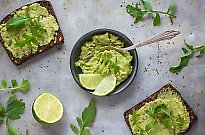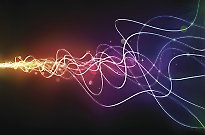
10 ways to boost your energy levels

Feeling sluggish? Maybe it's time to reconsider your diet
Eating the right foods can not only boost vitality, it can help you make the most out of your fitness regime. Liz Nowosad discovers 10 ways to increase energy levels and boost your va-va voom!
1. Hydration
Dehydration is one of the main causes of fatigue. Muscles are 75 per cent water and a loss of just three per cent of this causes a 10 per cent drop in strength and an eight per cent loss in speed. If you aren’t drinking enough water each day you may be in a permanent state of mild dehydration, which will have a significantly detrimental effect on your energy levels. Drink at least 1½ litres of mineral or tap water every day and limit salt consumption as excess can cause dehydration. During exercise, take small sips every 15 minutes.
2. Eat light
It’s not just what we eat, it’s how we eat and like under eating, over eating (no matter how healthy the food) is a huge energy zapper. We’ve all experienced that heavy lethargy following a blow-out dinner. Oversized meals put our bodies under a lot of strain, and digesting large quantities leaves us feeling exhausted… good for nothing but the sofa. It takes 20 minutes to register that you are full so try to slow down. Take breaks during meals, put your knife and fork down between mouthfuls and always eat from a plate sitting down, ideally with no distractions. One of the easiest ways to avoid over eating is to dish up smaller portions. If you have large dinner plates swap them for smaller ones and only have a second helping if 30 minutes has passed and you are still genuinely hungry.
3. Choose the right carbohydrates
Carbohydrates are vital for maximum vitality as they are the premium fuel for energy. However, refined carbs like white rice, white bread and white pasta, chocolate and lollies release their energy quickly because most of the fibre has been removed in the refining process, meaning our bodies have very little work to do to break down and digest them. This causes a surge in insulin levels, necessary to mop up the sudden high sugar quantities in the bloodstream, putting us on a rollercoaster of highs and lows, and causing our energy levels to peak and trough. The best way to avoid these energy troughs is to avoid the refined carbohydrates that cause the blood sugar level peaks and instead, choose slow release wholegrain carbohydrates like porridge oats, brown rice, whole meal pasta and wholegrain bread. These foods are released gradually into the blood stream, stabilising insulin release, which in turn keeps our blood sugar and energy levels on a sustainably even keel. No trough = no energy dip!
4. Don’t cut calories
“Many women arrive to see me weepy and tired out, caught in a cycle of eating as little as they can or trying to avoid carbohydrates, then binging because they are starving,” says nutritionist Debbie Mason. Cutting calories leaves you feeling lethargic and weak. A sudden drop in calories tells your body to conserve energy so it will hoard rather than burn fat and start to break down lean muscle tissue (the good stuff) for fuel. “Once I get clients back on a normal balanced diet we see great results and soaring energy levels,” says Mason. Calorie restricting also hinders your efforts at the gym – that’s if you are able to summon the energy or motivation to get yourself there in the first place!
5. Get your vitamins
Vitamins and minerals are essential for optimum well-being and vitality. Virtually all vitamin and mineral deficiencies manifest themselves as chronic or mild fatigue, among other things. Deficiencies in iron, zinc or magnesium are especially common in women, so up your intake of foods rich in these minerals like green leafy veg (the darker the better), broccoli, lean meat and wholegrains. Eat a well balanced diet, and supplement with a good multi-vitamin daily. If you take regular exercise, it’s important to increase your intake of antioxidant nutrients as these help the body to use oxygen and detoxify the by-products of making energy. Antioxidant vitamins include vitamins A, C and E.
6. Don’t run on empty
Exercising on an empty stomach will cause you to tire more quickly, making your workout less effective. “If you exercise on empty you are likely to find that you’re exhausted in the first 15 minutes or that you get dizzy half way through your workout. Try to eat something light before hand. A small banana, a low fat yogurt, a glass of milk or a slice of toast all work well,” claims Turnbull.
7. Take a snack
Try not to go more than four hours without food, because eating little and often keeps the metabolism fired up and energy levels constant. It is especially important to eat after exercise. “To ensure your body can recover and repair itself, always have a low fat, carbohydrate rich meal or snack which includes protein within two hours after exercise. A glass of milk and piece of fruit, a yogurt, crackers with cottage cheese or small can of tuna are all ideal,” says nutrition and health consultant, Claire Turnbull. Skipping the post-workout snack or meal will delay your recovery and leave you feeling sluggish and tired the next day.
8. Don’t look to stimulants to boost energy levels
Contrary to popular belief, stimulants such as coffee, alcohol, tobacco and anti-depressants rob us of energy. The ‘high’ experienced is energy leaving the system in a great surge, but it is still our energy being used. This energy leaves the body at a rate much greater than our natural ability to replace it, leaving us depleted and feeling wiped out soon after. Asian or Siberian ginseng (available from health stores) are both good natural stimulants if you need a boost.
9. Essential Fats are your friends
While fat may not be the best fuel for the body, essential fats have many important benefits for increasing energy levels. They help transport oxygen and keep red blood cells, the oxygen carriers, healthy. They are vital for the immune system, which is often taxed in people who take a lot of exercise. They are a back up source of energy and, they actually increase metabolic rate. Saturated fats found in junk food and snacks however, are a definite no-no for anybody embarking on a fitness regime or hoping to increase energy levels. Omega 3’s are especially beneficial for exercise as they improve exercise endurance and lower insulin levels, which boosts fat metabolism. Aim for at least one portion of oily fish a week and eat seeds, avocado, nuts and their oils daily.
10. Digestion – keep your insides working healthily
Many of us complain of tiredness after eating a normal sized meal, but in fact, this is Mother Nature’s intention and you shouldn’t fight it. The digestive system needs a plentiful supply of oxygen to enable it to work properly. If you get up and rush around immediately after eating, or eat on the move, oxygen is diverted away from the stomach to other muscles, meaning the stomach and the rest of the gut become slightly lacking in oxygen, hindering digestion. In an attempt to prevent us from doing this, we release hormones that make us feel sleepy immediately after a meal. The Mediterranean habit of taking a siesta after a meal is a good one, but 10 to 15 minutes of relaxation after eating will suffice. This 15-minute break will give more sustainable energy over the next few hours. A top tip for optimum digestion from naturopath and medical herbalist, Angela Haldane, is to eat sour foods before a meal. “It stimulates the secretion of digestive enzymes so you get more nutrients out of your food, and therefore more energy. It also makes your digestive process more efficient. Try fresh lemon squeezed in water or apple cider vinegar in water.”
Get more nutrition advice, find out how to lower your cholesterol and share your diet tips on Facebook.


